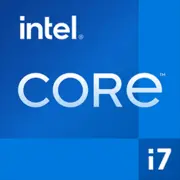Intel Core i7-14700F

The Intel Core i7-14700F processor is an impressive addition to the desktop CPU market. With a 10nm technology, it offers efficient performance with a total of 20 cores and 28 threads, making it suitable for both heavy-duty multitasking and intense gaming. The performance-core base frequency of 2.1 GHz and a max turbo frequency of 5.4 GHz ensure smooth and seamless operation across various applications. The 30MB L3 cache also contributes to enhancing the overall speed and responsiveness of the processor.
One of the standout features of the i7-14700F is its 65W TDP, which makes it relatively power-efficient compared to other high-performance processors in its class. This is particularly noteworthy for users looking to build energy-efficient systems without compromising on processing power.
In benchmark tests, the i7-14700F has proven its capabilities with a Geekbench 6 single-core score of 2804 and a multi-core score of 19972, showcasing its ability to handle demanding workloads with ease.
Overall, the Intel Core i7-14700F is a powerhouse processor that delivers exceptional performance, efficiency, and reliability, making it a compelling choice for desktop users looking for top-notch processing power.
Basic
Label Name
Intel
Platform
Desktop
Launch Date
January 2024
Model Name
?
The Intel processor number is just one of several factors - along with processor brand, system configurations, and system-level benchmarks - to be considered when choosing the right processor for your computing needs.
i7-14700F
Code Name
Raptor Lake Refresh
CPU Specifications
Total Cores
?
Cores is a hardware term that describes the number of independent central processing units in a single computing component (die or chip).
20
Total Threads
?
Where applicable, Intel® Hyper-Threading Technology is only available on Performance-cores.
28
Performance-cores
8
Efficient-cores
12
Performance-core Base Frequency
2.1 GHz
Efficient-core Base Frequency
1.5 GHz
Performance-core Max Turbo Frequency
?
Maximum P-core turbo frequency derived from Intel® Turbo Boost Technology.
5.4 GHz
L1 Cache
80K per core
L2 Cache
2MB per core
L3 Cache
30MB shared
CPU Socket
?
The socket is the component that provides the mechanical and electrical connections between the processor and motherboard.
LGA-1700
Technology
?
Lithography refers to the semiconductor technology used to manufacture an integrated circuit, and is reported in nanometer (nm), indicative of the size of features built on the semiconductor.
10 nm
TDP
65 W
Max. Operating Temperature
?
Junction Temperature is the maximum temperature allowed at the processor die.
100°C
Memory Specifications
Memory Type
?
Intel® processors come in four different types: Single Channel, Dual Channel, Triple Channel, and Flex Mode. Maximum supported memory speed may be lower when populating multiple DIMMs per channel on products that support multiple memory channels.
DDR5-6000
Max Memory Size
?
Max memory size refers to the maximum memory capacity supported by the processor.
128GB
Memory Channels
?
The number of memory channels refers to the bandwidth operation for real world application.
2
GPU Specifications
Integrated Graphics Model
?
An integrated GPU refers to the graphics core that is integrated into the CPU processor. Leveraging the processor's powerful computational capabilities and intelligent power efficiency management, it delivers outstanding graphics performance and a smooth application experience at a lower power consumption.
No
Benchmarks
Cinebench R23
Single Core
Score
2042
Cinebench R23
Multi Core
Score
31423
Geekbench 6
Single Core
Score
2804
Geekbench 6
Multi Core
Score
19972
Geekbench 5
Single Core
Score
1741
Geekbench 5
Multi Core
Score
14623
Passmark CPU
Single Core
Score
4342
Passmark CPU
Multi Core
Score
44921
Compared to Other CPU
Cinebench R23 Single Core
Cinebench R23 Multi Core
Geekbench 6 Single Core
Geekbench 6 Multi Core
Geekbench 5 Single Core
Geekbench 5 Multi Core
Passmark CPU Single Core
Passmark CPU Multi Core
Share in social media
Or Link To Us
<a href="https://cputronic.com/cpu/intel-core-i7-14700f" target="_blank">Intel Core i7-14700F</a>